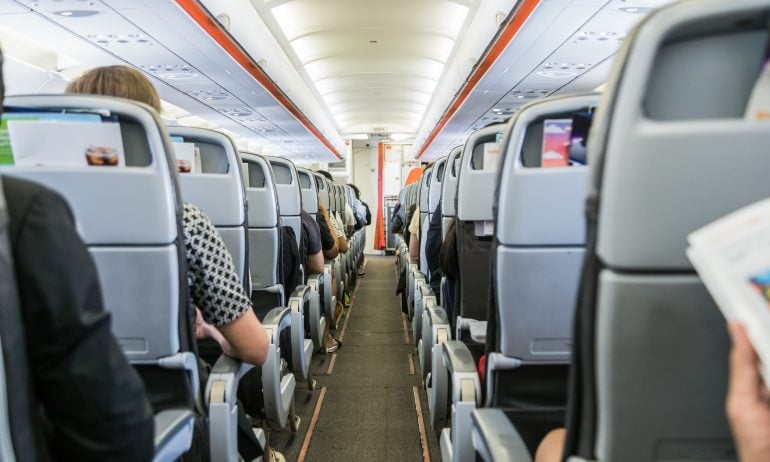Ask a Travel Nerd: What’s the Deal With Basic Economy?

Many or all of the products featured here are from our partners who compensate us. This influences which products we write about and where and how the product appears on a page. However, this does not influence our evaluations. Our opinions are our own. Here is a list of our partners and here's how we make money.
Seat assignments have nothing to do with getting bumped from a flight.
Every airline has its own rules for what basic economy actually means.
You can’t change or cancel most basic economy fares.
Humanity remains in the dark about so many great mysteries. What is consciousness? Are we the only intelligent life in the cosmos? And what’s the difference between main cabin and basic economy airfare?
I’ve written a lot about basic economy, explaining when to book it, how much it saves and why the airlines themselves don’t really want you to book these low-priced fares. But the topic remains a mystery for many, including this column’s most devoted readership: my family.
I booked a basic economy flight for my nephew recently and, judging from my family’s reaction, you’d think I sent him to Siberia. “What if he’s bumped off his flight?” they asked. “Huh?” I responded.
To be fair, airlines have made the rules and fees associated with basic economy fares extraordinarily complicated, so nobody should feel bad for being confused. But there are some common misconceptions about basic economy fares that are worth clearing up before considering that low-cost ticket for your next flight.
Misconception 1: You might not get a seat
If you haven’t flown much in the past few years, you might have missed a major change in how airlines handle seat assignments. In the olden days, you’d buy a ticket, pick a seat and that was it. Now, seat assignments are treated like a perk, with fees and restrictions applied to the mere action of selecting any seat at all.
These confusing fees are baked into the basic economy game as well. Other than American Airlines, all major U.S. airlines severely restrict seat assignments during the purchase of a basic economy fare.
Let’s break down what this actually means: On most airline basic economy tickets, you won’t be able to select your seat ahead of time. Instead, you’ll be assigned one at check-in or the gate.
So you're not any more likely than any other passenger to get bumped from the flight. Your basic ticket confirms that you'll get a seat on the plane — it just doesn’t confirm which seat that will be.
Misconception 2: The basic economy experience is the same on every airline
I recently did an in-depth analysis of U.S. airlines' basic economy rules and was shocked by how many differences I found. For starters, some give these fares another name. JetBlue calls them Blue Basic. Alaska calls them Saver. (Annoying, I know.)
More importantly, the airlines have completely different rules for trip flexibility, how miles are earned, how standby is managed and how much they upcharge for main cabin fares.
Here's a look at how the price differences vary between basic economy and main cabin tickets:
Airline | Average difference in cost between main cabin and basic economy round-trip fares |
|---|---|
Alaska Airlines | $73. |
American Airlines | $72. |
Delta Air Lines | $70. |
Hawaiian Airlines | $80. |
JetBlue Airways | $53. |
United Airlines | $49. |
There's a $33 difference in price between the highest and lowest cost markup.
Note: American Airlines is excluded from this list because, weirdly, we couldn't find enough basic economy fares on American. (This is a good thing and means the cost of an American flight in search engines might be significantly lower than the effective cost of other airfare.)
I further boiled down all of the differences to a simple 5-point rating system to show which basic economy ticket is least basic.
American came out on top.
These ratings are helpful for determining which basic economy fares to avoid and which to target. They're not very useful, however, for understanding the underlying rules. If you often fly with, say, Delta, and manage to wrap your head around its rules for basic economy, that won’t help you understand whether to book a similar fare on Alaska.
Unfortunately, there’s no way to say “Basic economy means X.” Instead, think of it more like: “Basic economy on Y airline means X.”
Misconception 3: You can change or cancel basic economy tickets for free
There was a lot of hoopla in the travel world last year when most major U.S. airlines eliminated change and cancellation fees. You might have heard this news and determined, understandably, that it meant that airlines had indeed eliminated change and cancellation fees.
But there's a big caveat that many stories overlooked: These policies don't apply to basic economy fares. Instead, and quite specifically, most basic economy fares can't be changed or canceled — period.
This distinction is major, and is now the biggest reason to pay the upcharge for a main cabin fare. Unless you’re absolutely sure of your travel plans, it’s likely worth paying more for an effectively refundable main cabin fare to avoid the potential of having to book an entirely new basic economy ticket.
Basic economy, recapped
If you feel overwhelmed or confused about what is basic economy, take heart. I literally do this for a living, and every time I book airfare, I twist myself in knots over whether to buy basic economy or upgrade to main cabin. It’s confusing by design.
Yet if you understand some common points of confusion, you'll be ahead of the bulk of other travelers. You're not at greater risk of getting bumped, the basic economy experience will vary airline to airline and, perhaps most importantly, most basic economy fares can't be changed or canceled.
Does that make sense, Dad? Err … dear readers?
Have a question about travel? How to use points and miles? Send your questions to [email protected]. Dad: You can still send your questions to my personal email.
How to maximize your rewards
You want a travel credit card that prioritizes what’s important to you. Here are our picks for the best travel credit cards of 2023, including those best for:
Flexibility, point transfers and a large bonus: Chase Sapphire Preferred® Card
No annual fee: Bank of America® Travel Rewards credit card
Flat-rate travel rewards: Capital One Venture Rewards Credit Card
Bonus travel rewards and high-end perks: Chase Sapphire Reserve®
Luxury perks: The Platinum Card® from American Express
Business travelers: Ink Business Preferred® Credit Card
on Chase's website
1x-5x
Points60,000
Pointson Chase's website
1.5%-6.5%
Cashback$300
2x-5x
Miles75,000
Miles




